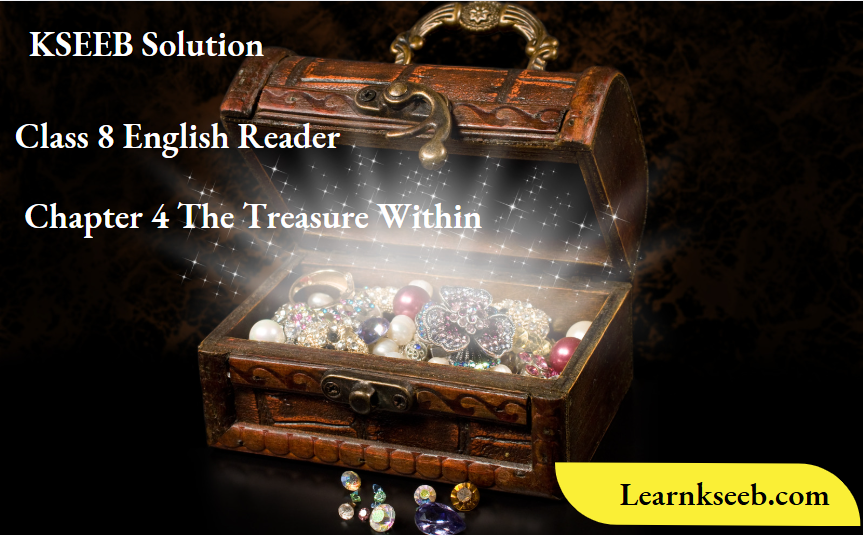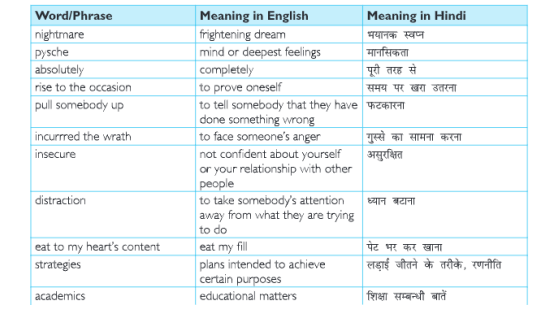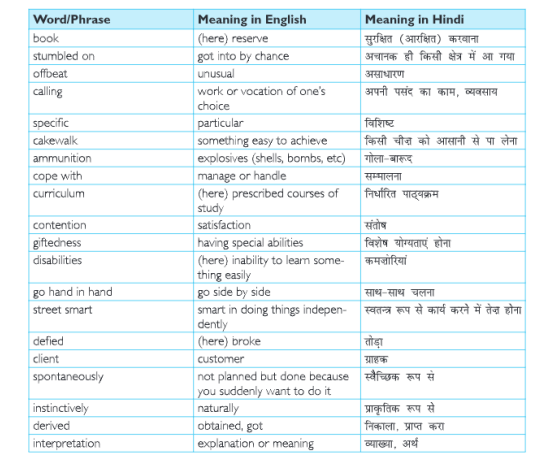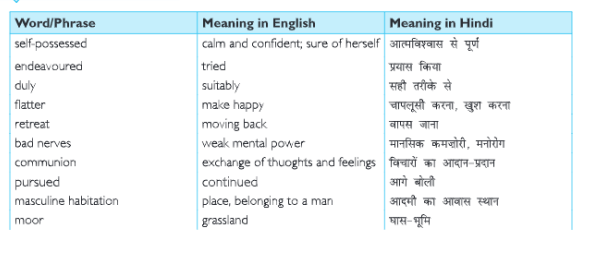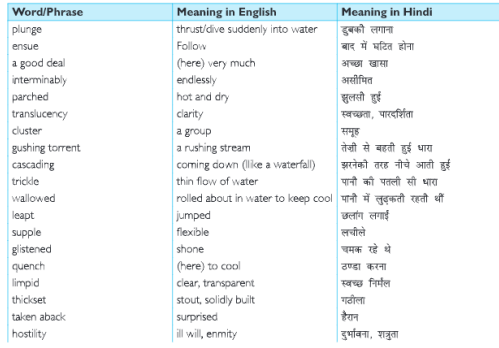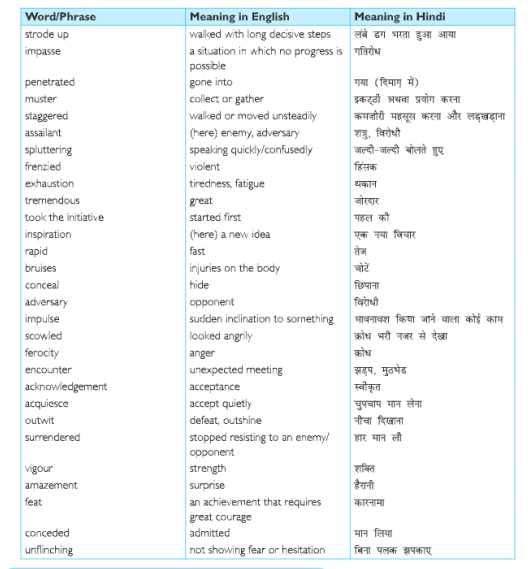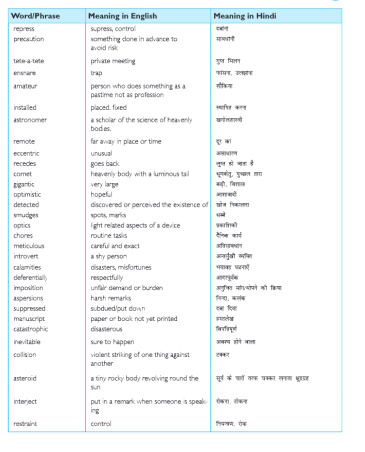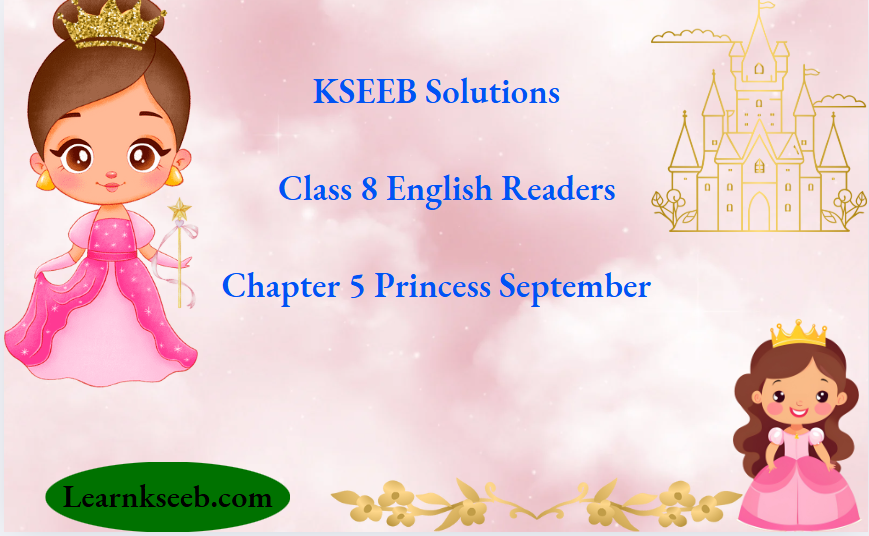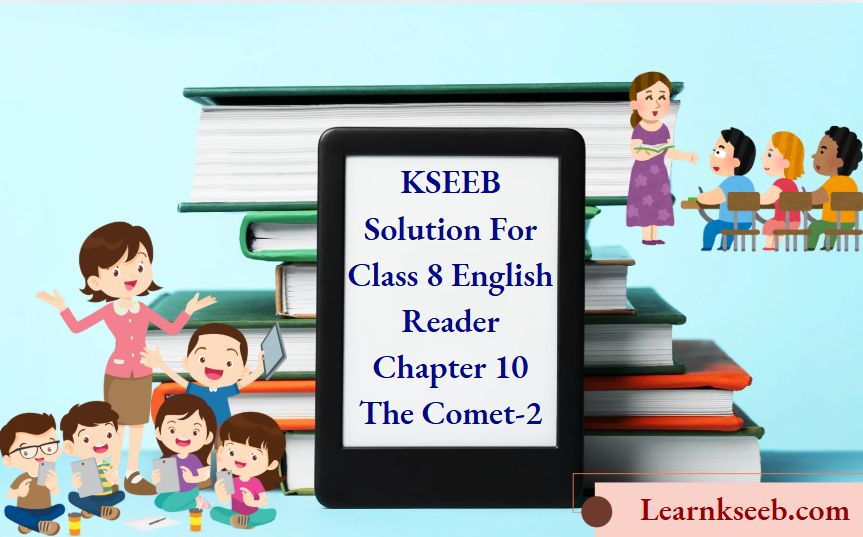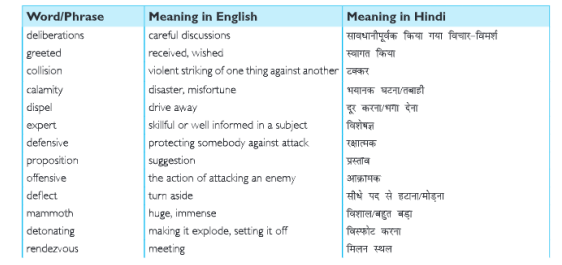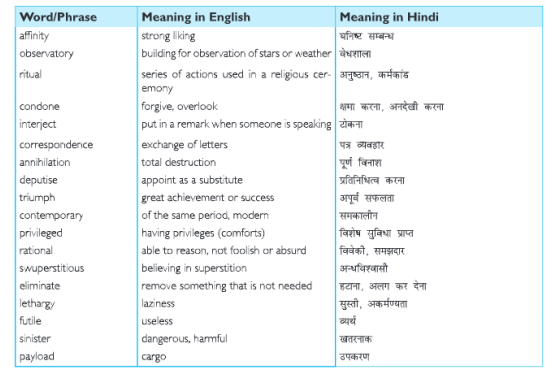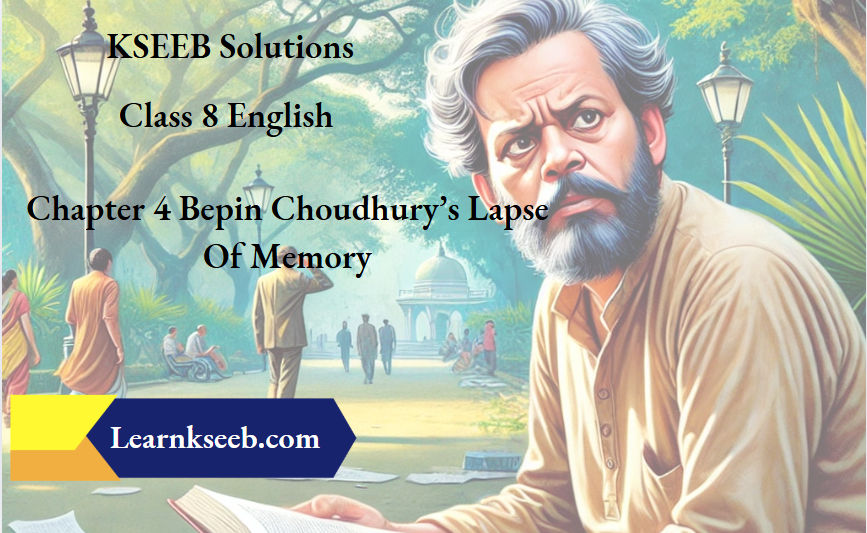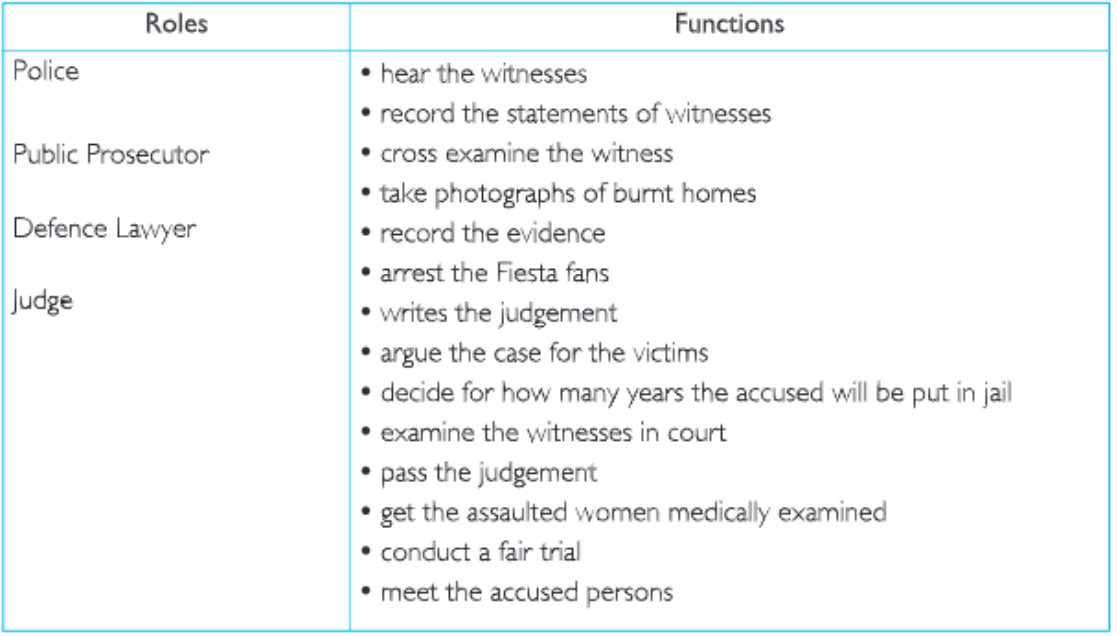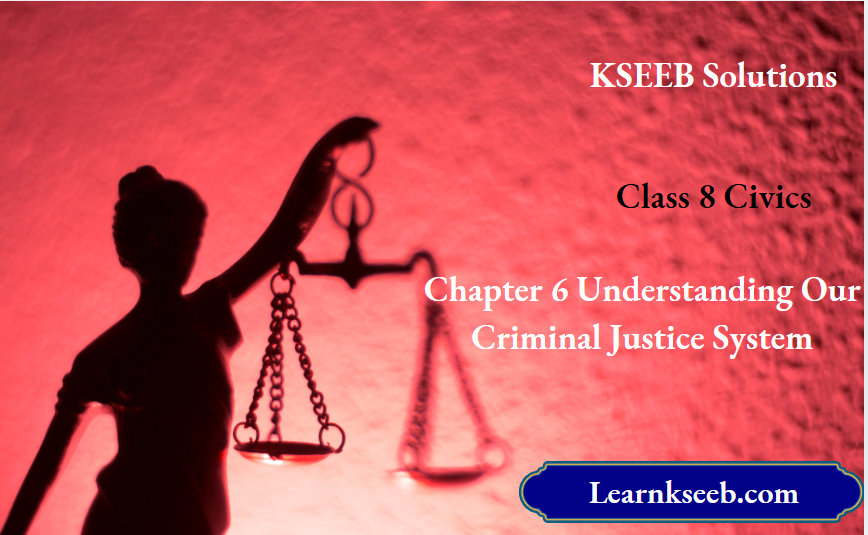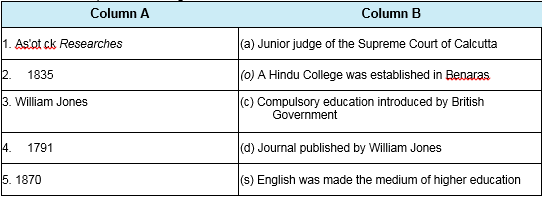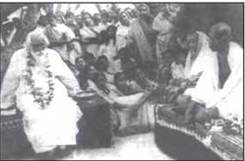KSEEB Solutions for Class 8 English Chapter 9 The Great Stone Face Summary In English
In the first part of the story “The Great Stone Face’, the author informs us that a stone face was formed by the action of nature on a mountain.
A boy named Ernest used to live in a cottage overlooking the Great Stone Face. Emest was curious about the Great Stone Face. In his town, the Great Stone Face was associated with many stories and myths.
One of them was a prophecy that a man resembling the Great Stone Face would come in the future and this man would become the greatest and the noblest person of his time. Emest’s mother told him about the prophecy. Days went by, Earnest grew up with a great fascination to meet the Great Stone Face.
Once there was a rumour that a very rich man whose name was Gathergold resembled the Great Stone Face. The town folks applauded Gathergold as the man of the prophecy.
When Emest had the chance to see him in person he was greatly disappointed. As the years passed by, Ernest kept expecting to meet the man of the prophecy. He became more engrossed in watching and observing the Great Stone Face. By now the Great Stone Face had become his ideal teacher. Meanwhile Mr Gathergold lost his money and died of old age.
A great commander named Mr Blood-and-Thunder became famous as the Great Stone Face. The town rejoiced with the idea that he was the man of the prophecy. In a gather when Emest could actually see him, he was extremely disappointed to see that he was nothing like the Great Stone Face.
Yet, Ernest remained hopeful that one day he would meet the man with the same face as the Great Stone Face in the end of the story, Ernest consoled himself saying.” Fear not, Ernest he will come.”
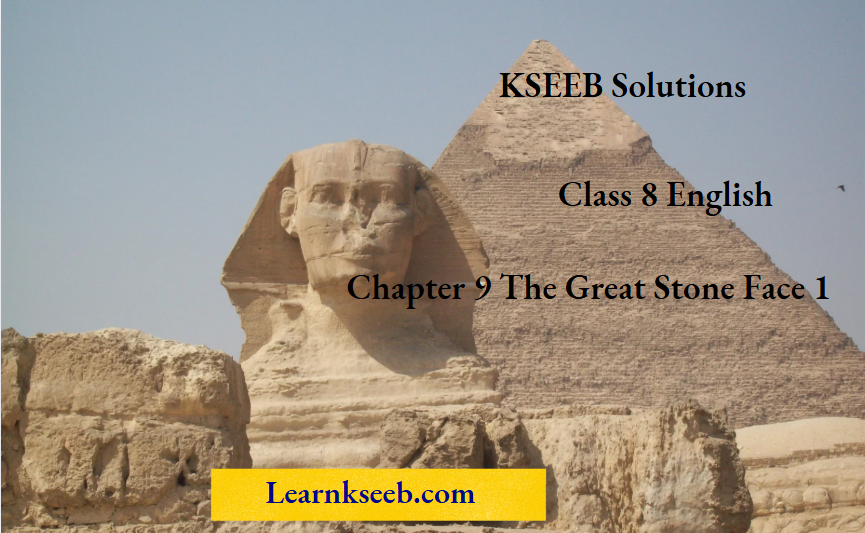
The Great Stone Face Summary In Hindi
लेखक कहानी ‘पत्थर की उत्कृष्ट मुखाकृति’ में बताता है कि पत्थर की विभिन्न आकृतियाँ पहाड़ पर होने वाली प्राकृतिक अभिक्रियाओं के द्वारा बनती है।
अर्नेस्ट नाम का एक लड़का पत्थर की उत्कृष्ट मुखाकृति के सामने बने एक झोंपड़े में रहता था। वह पत्थर की उस उत्कृष्ट मुख्याकति के बारे में जानने को बहुत उत्सुक रहता था। उसके शहर में उस पत्थर की उत्कृष्ट मुखाकृति के बारे में अनेक कहानियाँ और दंतकथाएँ प्रचलित थी उनमें से एक वाणी यह थी कि पत्थर की उस उत्कृष्ट मुखाकृति वाला व्यक्ति मविष्य में एक दिन अवरम अवतरित होगा तथा वह अपने समय का सबसे महान व दयावान व्यक्ति होगा।
अनेस्ट की माँ ने उसे इस भविष्यवाणी के बारे में बताया था। समय बीतता गया, अर्नेस्ट अपने दिल में पत्थर की उस उत्कृष्ट मुखाकृति वाले व्यक्ति से मिलने की प्रबल उत्कंठा के साथ बड़ा होता गया। उसी दौरान एक अफवाह फैली कि नैदरगोल्ड नामक एक अमीर व्यक्ति का मुखमंडल पत्थर की उस उत्कृष्ट से मिलता है। शहर के लोगों ने खुशी से मैदरगोल्ड को वाला अवतार मान लिया। जब अर्नेस्ट को आमने-सामने से उस व्यक्ति को देखने का मौका मिला तब उसे भारी निराशा हुई। कई साल बीत गए, अर्नेस्ट के दिल में उस अवतार से मिलने की इच्छा बलवती होती गई। यह पत्थर की उस उत्कृष्ट पुखाकृति को और भी बारीकी से देखता। अब पत्थर की वह उत्कृष्ट मुखाकृति ही उसकी आदर्श शिक्षिका बन गई। उधर गैदरगोल्ड की
सारी संपत्ति नष्ट हो गई और बुढ़ापे के कारण उसका देहावसान हो गया। अब मिस्टर ब्लड एंड थंडर नाम का एक कमांडर पत्थर की उस उत्कृष्ट मुखाकृति के अवतार के रूप में विख्यात हुआ। लोग फिर से उसे अवतार के रूप में मानकर बहुत खुश हुए। किसी जगह इकट्ठी हुई भीड़ में अर्नेस्ट ने जब उसे वास्तविक रूप में देखा तब उसे फिर से बड़ी निराशा हुई, क्योंकि उसमें पत्थर की उस उत्कृष्ट मुखाकृति जैसा कुछ भी नहीं था। इसके बावजूर, अनेस्ट अब भी आशाबान था कि एक न एक दिन वह जरूर उस आदमी से मिलेगा जो पत्थर की उस उत्कृष्ट मुखाकृति के समान चेहरे वाला होगा। कहानी के अंत में अर्नेस्ट स्वयं को यह कहकर सांत्वना देता है, “डरो मत अनेस्ट का जरूर आएगा।”
Class 8 English KSEEB Chapter 9 The Great Stone Face 1 Summary
The Great Stone Face Hindi Translation Of The Lesson
1.Seen from a distance, hilltops and huge rocks seem to assume various shapes. They may resemble an animal or a human figure. People attribute stories to these shapes. Some stories come true: others don’t.
The Great Stone Face is one such shape that reminds the inhabitants of the valley of a prophecy. What was it? Did it come true?
दूर से देखने पर पहाड़ियों को पोटियां तथा विशाल चट्टानें विभिन्न आकृतियाँ धारण करती दिखाई देती है। वे किसी पशु अथवा किसी मानव आकृति के सामान दिखाई दे सकती हैं। लोग इन आकृतियों के साथ कहानियाँ जोड़ देते हैं। कुछ कहानियाँ तो सब सिद्ध हो जाती है, कुछ नहीं मिशाल पत्थर का चेहरा ऐसी ही एक आकृति है जो घाटी के निवासियों को एक की याद दिलाती है। यह क्या क्या यह सब सिद्ध हुई?
Word Meanings
- assume-suppose to be the case, without
- proof, सच मान लेना
- attribute characteristic, quality, उपाधि
- prophecy foretelling, भविष्यवाणी
- huge big बहुत बढ़ा
- inhabitants – People who resides in a place
- निवासी
- One afternoon, when the sun was going down, a mother and her little boy sat at the door of their cottage, talling about the Great Stone Face They had only to lift their eyes and there it was, plain to be seen, though miles away, with the sunshine brightening all its features. And what was the Great Stone Face? The Great Stone Face was a work of nature, formed on the perpendicular side of a mountain by some immense rocks, which had been thrown together so that, when viewed at a proper distance, they resembled the features of a human face. If the spectator approached too near, he lost the outline of the enormous face and could see only a heap of gigantic rocks, piled one upon another. But seen from a distance, the clouds clustering about it, the Great Stone Face seemed positively to be alive. It was the belief of many people that the valley owed much of its fertility to the benign face that was continually beaming over it.एक दिन दोपहर बाद जब सूर्य अस्त हो रहा था. एक माँ और उसका छोटा सा लड़का अपनी झोपड़ी के द्वार पर बैठे पत्थर के उस विशाल चेहरे के बारे में बाते कर रहे थे। आंख खुलते ही उन्हें वह चेहरा साफ दिखाई देता था, यद्यपि यह मीलों दूर था, सूर्य की रोशनी में उसके नयन-नक्श चमक उठतो थे और वह विशाल पत्थर का घंहरा था क्या?पत्थर का विशाल चेहरा प्रकृति की एक रचना भी जो बड़ी-बड़ी चट्टानों द्वारा पर्वत के एक ओर बना था। वे (चट्टाने) इस प्रकार बिखरी पड़ी थीं कि जब उन्हें उचित दूरी से देखा जाए तो वे किसी मानवीय चेहरे जैसी दिखाई देता थीं। यदि कोई दर्शक उसके अधिक निकट पहुंच जाता था तो उस विशाल चेहरे की रूप-रेखा उसकी नजरों से ओझल हो जाती थी और उसे विशाल ऊबड़-खाबड़ एक दूसरी पर पड़ी चट्टानों के ढेर दिखाई पड़ते थे। परन्तु दूर से देखने पर बादलों से घिरा पत्थर का विशाल चेहरा निश्चित रूप से सजीव नज़र आता था। बहुत से लोगों का विश्वास था कि घाटी की उपजाऊ शक्ति उस सौम्य चेहरे की देन है।
Word Meanings
- spectator audence, देखने वाले
- enormous very big बहुत बढ़ा
- positively definitely, निश्चित रूप में
- perpendicular rising very steeply, लम्बवत
- A mother and her little boy, as we said earlier, sat at the door of their cottage, gazing at the Great Stone Face and talking about it. The child’s name was Emest. “Mother,” said he, while the Great Face smiled on him, I wish that it could speak, for it looks so very kindly that its voice must indeed be pleasant. If I ever see a man with such a face, I should love him very much.”
- “If an old prophecy should come to pass” answered his mother, “we may see a man some time, with exactly such a face as that.”
“What prophecy do you mean, dear Mother eagerly inquired Ernest. “Please tell me about it.”
जैसा हम ने पहले कहा था, एक माँ और उसका छोटा सा लड़का अपनी झोपड़ी के द्वार पर बैठे पत्थर के उस विशाल चेहरे को देख रहे थे। बच्चे का सम था अर्नेस्ट l
जब विशाल चेहरा उसे देख कर मुस्कराया तो वह बोला, “माँ काश यह चेहरा बोला पाता। क्योंकि यह बहुत ही यावान दिखाई देता है, इसका स्वर भी वास्तव में भी मधुर होगा। यदि मैंने कभी इस चेहरे वाले आदमी को देखा तो उससे बहुत स्नेह करूँगा।”
माँ ने उत्तर दिया, “यदि एक पुरानी भविष्यवाणी सच हो जाती है तो सम्भव है हमें कभी वह व्यक्ति दिखाई दे जाए जिसका चेहरा बिल्कुल इस चेहरे जैसा हो।”
अर्नेस्ट ने उत्सुकता से पछा, “प्यारी माँ, आप किस भविष्यवाणी की बात कर रही हैं? कृपया मुझे इसके बारे में
Word Meanings
- prophecy prediction,
- to pass – to become true (here), सच हो जाए
- So his mother told him a story that her own mother had told her, when she herself was younger than little Emest; that, at some future day, a child should be bom near here who was destined to become the greatest and noblest person of his time and whose face, in manhood, should bear an exact resemblance to the Great Stone Face.
- Many still had faith in this old prophecy. But others took it to be nothing but idle talk At all events the great man of the prophecy had not yet appeared, “), Mother;” cried Emest, clapping his hands above his heact I do hope that I shall live to see himi” His mother was an affectionate and thoughtful woman.
- It was proper, she thought, not to discourage the fanciful hopes of her little boy. So she said to him “Perhaps you may.”अतः उसकी माँ ने उसे एक कहानी सुनाई जो उसे (माँ का) उसकी माँ ने तब सुनाई थी जब वह किशोर अर्नेस्ट से छोटी थी कि भविष्य में किसी दिन वहीं आस-पास एक बच्चे का जन्म होगा जो अपने समय का सबसे महात् और नेक व्यक्ति होगा और बढ़ा होने पर उसकी शक्ता पत्थर के चेहरे से मेल खायगी बहुत से लोगों का अब भी इस पुरानी भविष्यवाणी पर विश्वास था। परन्तु अन्य इसे व्यर्थ की बात समझते थे। कुछ भी हो भविष्यवाणी का महान् पुरूष अभी तक प्रकट नहीं हुआ था।अर्नेस्ट सिर के ऊपर हाथ करके ताली बजाते हुए उत्सुकता से बोला, “माँ मुझे पूरी आशा है कि मैं उस चेहरे को देखने के लिए जीवित रहूंगा।”उसकी माँ एक स्नेहमयी और विचारशील महिला थी। उसने सोचा कि यह उचित ही होगा कि वह अपने छोटे से बच्चे की काल्पनिक आराओं को निरुत्साहित न करे। अतः उसने बच्चे से कहा, ” सम्भव है तुम्हे वैसा व्यक्ति मिल जाए।”
Word Meanings
- noblest admirable, उत्तम
- affectionate – loving स्नेही
- thoughtful meditative विचार
- discourage – to dishearten, fra BEN
- fanciful visionary, काल्पनिक
- And Ernest never forgot the story that his mother told him. It was always in his mind whenever he looked upon the Great Stone Face. He spent his childhood in the log-cottage where he was born, was dutiful to his mother and helpful to her in many things, assisting her much with his little hands and more with his loving heart. In this manner, from a happy yet often pensive child he grew up to be a mild and quiet youth
Ernest had had no teacher, but the Great Stone Face became one to him. When the work of the day was over, he would gaze at it for hours, until he began to imagine that those vast features recognised him, and gave him a smile of kindness and encouragement.
और अर्नेस्ट अपनी माँ द्वारा बताई गई कहानी कभी भूला नहीं। जब कभी वह उस विशाल चेहरे को देखता तो यह कहानी उसे सदा याद रहती वह अपनी माँ के प्रति कर्तव्यनिष्ठ था और अपने छोटे-छोटे हाथों और अपने प्रेम भरे मन से माँ की सहायता करते हुए उसने अपना बचपन उस लकड़ी की झोपड़ी में गुजारा जहां वह पैदा हुआ था। इस प्रकार वह एक प्रसन्न एवं विचारशील बच्चे से बड़ा एक विनम्र और शान्त स्वभाव का व्यक्ति बन गया।
अर्नेस्ट का कोई शिक्षक नहीं था, परन्तु पत्थर का वह विशाल चेहरा उसका शिक्षक बन गया। उस दिन के काम की समाप्ति पर, वह घंटो तब उस चेहरे को निहारता रहता जब तक वह यह महसूस नहीं करता कि वे विशाल-नयना नबरा उसे पहचानते हैं और उसकी ओर दयालुता से मुस्कुराते हुए उसे प्रोत्साहित करते हैं।
Word Meanings
- mild gentle, कोमल
- |pensive thoughtful, विचार मन
- About this time there went a rumour throughout the valley that the great man, who was to bear a resemblance to the Great Stone Face, had appeared at last. It seems that, many years before, a young man had left the valley and settled at a distant seaport.
Gathergold, which was his name, had set up as a shopkeeper and, being sharp in business matters, had become so very rich that it would have taken him a hundred years only to count his wealth. In time he thought of his native valley, and decided to go back there, and end his days where he had been born.
उन्हीं दिनों पूरी घाटी में एक अफचाह फैल गई कि यह महान् व्यक्ति जिसका चेहरा पत्र के विशाल चेहरे से मिलता है, आखिर जा पहुंचा है। ऐसा लगता है कि बहुत साल पहले एक नौजवान घाटी छोड़ कर दूर स्थित एक बंदरगाह में बस गया था उसका नाम गैदरनोरण उसने अपनी दुकान स्थापित कर ली थी। व्यवसाय में कुशलबुद्धि होने के कारण इतना अधिक भी बन गया था कि यह साल में भी अपना धन नहीं गिन सकता था। कुछ समय बाद उसे अपनी मातृपाटी की याद आई और उसने वहां लौटने का निश्चय किया ताकि वह अंतिम दिन वहीं गुखारे जहां उसका जन्म हुआ था।
Word Meanings
- Native a person born in a specified place, स्थानीय निवासी
- Emest had been deeply stirred by the idea that the great man, the noble man, the man of prophecy, after so many ages of delay, was at length to be seen in his native valley. While the boy was still gazing up the valley one day and imagining that the Great Stone Face returned his gaze, the noise of wheels was heard, and a crowd of people cried. “Here comes the great Mr.Gathergold.”
A carriage, drawn by four horses, dashed round the tum of the road. Within it, thrust partly out of the window appeared the face of an old man with yellow skin. “The very image of the Great Stone Face shouted the people. “Sure enough, the old prophecy is true. Here we have the great man at lath And, what greatly puzzled Ernest, they seemed actually to believe that here was the likeness which they spoke of. He turned away sadly from the wrinkled shrewdness of that unpleasant face, and gazed up the valley, where the Stone Face seemed to say: He will come Fear not, Eenest; the man will come!अर्नेस्ट इस विचार से बढ़ा विचलित था कि वह महान् पुरुष, नेक पुरुष भविष्यवाणी का पुरूष, सदियों के इनाखार के बाद घाटी में प्रकट हो रहा था। एक दिन जब लड़का घाटी पर दृष्टि चौड़ा रहा था और कल्पना कर रहा था कि पत्थर का चेहरा भी उसकी ओर देख रहा है, उसे गाड़ी के पहियों की खदखदाहट सुनाई दी। लोगों की भीड़ चिल्लाते हुए कह रही थी, “देखो, महान गैदरगोल्ड आ पहुंचे है।”चार घोड़ो वाली एक गाड़ी तेजी से सड़क के मोड़ पर पहुंची। खिड़की से बाहर पीले रंग का झुका हुआ चेहरा दिखाई दिया। लोग चिल्लाए, “दही पत्थर के विशाल चेहरे का प्रतिरूप है। निश्चित रूप से पुरानी भविष्यवाणी सत्व है। अन्त में वह महान् पुरुष आ पहुंचे है।”यह देखकर अर्नेस्ट को हैरानी हो रही थी कि लोग वास्ताव में ही विश्वास कर रहे थे कि उस व्यक्ति का चेहरा पत्थर के चेहरे से मेल खाता है, जिसके विषय में वे चर्चा किया करते थे। वह (आनैस्ट) उदास भाव से मुड़ा और ऊपर घाटी पर देखा जहां पत्थर का चेहरा यह कड़ता लग रहा था वह आएगा! चिन्ता मत करो, अप्रैस्ट: वह व्यक्ति आएगा!
Word Meanings
- carriage four wheeled vechicle, चौपहिया नादी
- dashed moved quicddy, तेवी से चलना
- image imitation प्रतिपूर्ति
- stirred-moved,
KSEEB Class 8 English Reader Solutions For The Great Stone Face 1
(8)The years went on, and Ernest grew to be a young man. He attracted little notice from the inhabitants of the valley. They saw nothing remarkable in his way of life, except that, when the labor of the day was over, he still loved to gaze upon the Great Stone Face. Their idea was that this was a folly, but pardonable, because Ernest was industrious, lind and neigh bourly. They did not know that the Great Stone Face had become a teacher to him, and that the sentiment which was expressed in it would enlarge the young man’s heart, and fill it with deeper sympathies than other hearts.
They did not know that from this would come a better wisdom than could be learnt from books. Neither did Ernest know that the thoughts which came to him so naturally, in the fields and at the fireside, were of a higher tone than those which all men shared with him. A simple soul-simple as when his mother first told him the old story-he beheld the marvellous face looking down the valley, and still wondered, why its human likeness was so long in coming
वर्ष गुजर गए और अनेस्ट जवान हो गया। माटी के लोग उसकी ओर कोई विशेष ध्यान नही देते थे। लोगों को उसके जीने के तरीके में कोई विशेष बात दिखाई नहीं देती थी। सिवाए इसके कि दिन के काम की समाप्ति पर वह अब भी पत्थर के चेहरे को निहारता रखता था। उनका विचार या कि यह शनायोग्य मूर्खता है क्योंकि अनेस्ट मेहनती, दयालु और मिलनसार है। से यह बात समझ न सके कि पत्थर का वह विशाल चेहरा उसका शिक्षक बन गया है और जो भव्यक्त किए गए हैं, वह इस युवक को विशाल हदय बला बना देश और उसे अन्य हृदयों की अपेक्षा सहानभूति से परिपूर्ण कर देगा में नहीं जानते हो कि पुस्तकों की अपेक्षा उसमें अधिक समदारी आएगी। न ही अट यह जानता था कि वो विचार खेतों में य आग के हुएइतने स्वाभाविक रूप से उसके मन में आते हैं विचारों से ऊंचे से निकालोग उसके साथ आदान-प्रदान करते थे। एक सीधा-सादा व्यक्ति-आस्ट अब भी इतना ही सौभा सादा थामिना माँ द्वारा कहानी सुनाए जाने के समय था उसने शानदार चेहरे को नीचे घाटी में झांकते देखा और वह अब भी हैरान था कि पत्थर के चेहरे से समानता रखने वाला व्यक्ति आने में इतनी देर क्यों कर रहा है।
Word Meanings
- labor work, कार्य, मेहन
- beheld-saw, tur
- By this time poor Mr.Gathergold was dead and buried. His wealth, which was the body and spirit of his existence, had disappeared before his death. Since the melting away of his gold, it had been generally agreed that there was no great likeness, after all, between the ruined merchant and the majestic face upon the mountain.
It so happened that another son of the valley had become a soldier many years before. After a great deal of hard fighting, he was now a famous commander. He was known on the battlefield by the name of Blood-and-Thunder. Old and tired now, he had lately expressed a desire to return to his native valley. The inhabitants, his old neigh and their grown up children, prepared to welcome the renowned commander. It was being said that at last the likeness of the Great Stone Face had actually appeared. Great, therefore, was the excitement throughout the valley, and many people who had never once thought of glancing at the Great Stone Face now spent much time in gazing at it, for the sake of knowing exactly how General Blood-and-Thunder looked.इसी बीच निर्धग गैदरनोल्ड का देहांत हो गया और उसे दवा दिया गया। उसको सम्पत्ति जो उसके शरीर तथा आत्मा के अस्तित्व का आभार थी, उसकी मृत्यु से पहले ही उसका व्यथ छोड़ गई थी। उसके पास कुछ न रहा तो लोग प्राय: यह मानने लगे कि उस कंगाल व्यापारी और पर्वत पर स्थित चेहरे में बहुत अधिक समानता नहीं है।हुआ यह था कि बहुत वर्ष पहले घाटी का एक अन्य बेटा सैनिक बन गया था भीषण पुर्थो के पश्चात् अब वह एक प्रसिद्ध कमांडर के रूप में जाना जाने लगा था। युद्ध क्षेत्र में वह ‘ब्लड एंड थंडर’ के नाम से प्रसिद्ध था। वृद्ध और थका हारा होने के कारण अब उसने अपनी जन्मस्थली में लौटने की घाटीवासियों उसके पुराने पहोलियों और उनेक युवा बच्चों ने उस प्रसिद्ध सैनिक कारवगत करने की तैयारियां की यह कहा जाने लगा था कि पके चेहरे समानता रखने भाला व्यक्ति प्रकट हो गया। इसलिए सारी घाटी में बढ़ा उत्साह था। वे लोग बिन्होंने एक बार भी पत्थर का चेहरा देखने के बारे में नहीं सोचा या अब उसे देखने में काफी समय बिताने लगे ताकि वे अच्छी तरह जान सकें कि जनरल एंड घंटर’ कैसे दिखाई देता
Word Meanings
- renowned famous प्रसिद्ध
- ruined destroyed, तबाह
- On the day of the general’s arrival Ernest and all the other people of the valley left their works and proceeded to the spot where a great banquet had been prepared. Soldiers stood on guard, flags waved and the crowd roared. Ernest was standing too far back to see Blood-and-Thunder’s face. However, he could hear several voices, it’s the same face, exactly cried one man, dancing for joy. Wonderfully ilke it, that’s a facts” replied another:
- “And why note cried a third “he’s the greatest man of this or any other age, beyond a doubt.”Ernest at last could see the general’s face, and in the same glance to the side he could also see the Great Stone Face. If there was such a likeness as the crowd proclaimed, Ernest could not recognist it.
- “Fear not, Ernest” said his heart, as if the Great Stone Face was whispering to him, Year not, Ernest, he will come”जनरल के आगमन के दिन अर्नेस्ट और घाटी के अन्य सभी लोग अपना काम छोड़ कर उस स्थान की ओर चल पड़े जहां एक महाभोज का आयोजन किया गया था। सैनिक चौकस थे झण्डं लहराए गए और लोगों की भीड़ खूब शोर कर रही थी। अर्नेस्ट इतना पीछे बड़ा था कि वह ‘ब्लड-एंड-थंडर’ का चेहरा नहीं देख सकता था। फिर भी वह कई आवा] सुन सकता थाव्यक्ति खुशी से नाचते हुए चिल्ला कर बोला, “यह हू-ब-हू वही चेहरा है।”
“हैरानी में डालने वाली समानता है, सच्ची बात है।” दूसरे ने उत्तर दिया।और क्यों न हो? तीसरे ने चिल्लाकर कहा, वह व्यक्ति है। इस युग का तथा किसी अन्य युग का सबसे महान्अन्त में अप्रैस्ट को जनरल का चेहरा दिखाई दे गया और उसी दृष्टि में एक ओर देखते हुए उसने पत्थर का विशाल चेहरा देखा। यदि लोगों की भीड़ की घोषणा के अनुसार कोई समानता थी तो अर्नेस्ट उसे पहचान न सका। “चिन्ता मत करो अनेस्ट” उसके मन से आवाज आई, मानो पत्थर का विशाल चेहरा ही उसके कानों में धीमे से कह रहा हो “चिन्ता मत करो, वह व्यक्ति आएगा अवश्य “
Word Meanings
- rugged-uneven surface,
- appeared-became visible,
The Great Stone Face 1 Class 8 KSEEB Questions And Answers
The Great Stone Face Textbook Exercises Comprehension Check
Write ‘True’ or ‘False’ for each of the following statements:
- The Great Stone Face stood near where Ernest and his mother lived. _____
- One would clearly distinguish the features of the Stone Face only from a distance. _______
- Ernest loved his mother and helped her in her work _______
- Though not very rich, Gathergold was a skilful merchant. ________
- Gathergold died in poverty and neglect _______
- The Great Stone Face seemed to suggest that Ernest should not fear the general. _____
Answer. 1.False, 2. True, 3. True 4. False, 5. True, 6. False,
The Great Stone Face Working With The Text
Answer the following questions.
- (1)What was the Great Stone Face!
(2)What did young Ernest wish when he gazed at it?
Answer.
- Great Stone Face was a fine work of nature. The mountain and rocks stood next to each other in such a way that it resembled the features of a human face.
- Young Ernest wished that the Stone Face could speak. Since it looked very kind, it felt he must have a very pleasant voice
- What was the story attributed to the Stone Face?
Answer. The story was that in future there was going to be a man, who was destined to become the greatest and noblest person of his time. This man would bear an exact similarity with the face of the Great Stone Face
- What gave the people of the valley the idea that the prophecy was about to come true for the first time?
Answer. A great man named Gathergold had attained a lot of wealth. He had now decided to come back to his native valley. There was a rumour in the valley that he resembled the Stone Face
Question 4. (1)Did Ernest see in Gather gold the likeness of the Stone Face?
(2)Who did he confide in and how was he proved right
Answer.
- No, Ernest did not see any likeness in Gather gold and the Stone Face.
- He confided in the Stone Face. The Face seemed to say that the man of the prophecy would come. Somebody did come.
Question 5. (1) What made people believe General Blood-and-Thunder was their man
(2) Ernest compared the man’s face with Stone Face .What did he conclude?
Answer.
- General Blood-and-Thunder was a famous commander who had fought a great deal in the battlefied. His friends from childhood said that he had always resembled the Stone Face. This made people believe that General Blood-and-Thunder was their man.
- He concluded that there was no likeness between the General’s face and the Stone Face. They ere totally different from each other.
Explanation Of The Great Stone Face 1 KSEEB Class 8
The Great Stone Face Working With Language
- Look at the following words,like — likenesspunctual — punctuality’
The words on the left are adjectives and those on the right are their noun forms.
Write the noun forms of the following words by adding -ness or -ity to them appropriately. Check the spelling of the new words.1.lofty_____ 6. enormous______
2.able_____ 7. pleasant_____
3.happy____ 8. dense______
4.near____ 9. great_____
5.noble___ 10. stable_____
Answer.
- loftiness
- ability’
- happiness
- nearness
- nobility
- enormity’
- pleasantness
- density
- greatness
- stability.
Question 2. Add-ly to each of the following adjectives, then use them to fill in the blanks. perfect near kind pleasant eager
- Why didn’t you turn up at the meeting ? We all were_____ waiting for you.
- ____write your name and address in capital letters.
- I was____ surprised to see him at the railway station. I thought he was not coming.
- It is_____ believable that I am rot responsible for this mess.
- He fell over the step and_____ broke his arm.
Answer.
- eagerly
- kindly
- pleasantly
- perfectly
- nearly.
Question 3. Complete each sentence below using the appropriate form of the verbs in brackets.
- I_____ (phone) you when I_____(get) home from school.
- Hurry up ! Madam____(be) annoyed if we (be) late.
- If it____ (rain) today, we_____(not) go to the play.
- When you_____(see) Mandal again, you______(not/recognise) him. He s growing a beard.
- We are off today. We_____ (write) to you after we (be) back.
Answer.
- shall phone, get
- will be annoyed, are
- rains, shall not
- see, will not recognise
- shall write, are.
The Great Stone Face Speaking And Writing
Question 1.Imagine you are Ernest. Narrate the story that his mother told him. Begin like this : My mother and I were sitting at the door of our cottage. We were looking at the Great Stone Face. I asked her if she had ever seen any one who looked like the Stone Face. Then she told me this story.
Answer. My mother and I were sitting at the door of our cottage. We were looking at the Great Stone Face. I asked her if she had ever seen any one who looked like the Stone Face. Then she told me this story. She told me that that according to an old prophecy at some future day, a child would be born in the valley who was destined to became the greatest and noblest person of his time. His face, in manhood, would bear an exact resemblance to the Great Stone Face.
Question 2.Imagine you are Gather gold. Write briefly the incident of your return to the valley. Begin like this: My name is Gather gold. I left the valley of the Great Stone Face fifty years ago. I am now going back home. Will the people of the valley welcome me ? Do they know that I am very rich ?
Answer. My name is Gather gold. I left the valley of the Great Stone Face fifty years ago. I am now going back home. Will the people of the valley welcome me ? Do they know that I am very rich ? I was surprised when I saw all the preparations town folks did to receive me. When I reached the town, everyone waved at me. I waved them back from my carriage. The carriage was drawn by four horses. It seemed that everyone was aware of my wealth and they cheered me on my good fortune. People shouted—”The very1 image of the Great Stone Face. The old prophecy has come true. We have the great man at last” They made me feel so special.
KSEEB notes for Class 8 English Chapter 9
The Great Stone Face Extract Based Questions
Read the extracts given below and answer the questions that follows.
- The Great Stone Face was a work of nature, formed on the perpendicular side of a mountain by some immense rocks, which had been thrown together so that, when viewed at a proper distance, they resembled the features of a human face. If the spectator approached too near, he lost the out ne of the enormous face and could see only a heap of gigantic rocks, piled one up on another. But seen from a distance, the clouds clustering, about it, the Great Stone Face seemed positively to be alive.
- Describe the Great Stone Face.
- How did it look from near?
- How did it look from a distance?
- How did it get this shape?
- Give the synonyms (meanings) of enormous, resemble.
Answer.
- Great Stone Face was a work of nature. It was formed on the perpend culor side of a mountain by huge rocks.
- From near, the stone face appeared like heap of gigantic rocks and the outline of face gets lost.
- From a distance, the face looked alive.
- The big rocks were positioned in such a way that it appeared to be a human race.
enormous-big resemble similar.
Question 2. So his mother told him a story that her own mother had told her, when she herself was younger than little Ernest; that, at some future day, a child should be born near here, who was destined to become the greatest and noblest person of his time and whose face, in manhood, should bear an exact resemblance to the Great Stone Face. Many still had faith in this old prophecy. But others took it to be nothing but idle talk. At all events the great man of the prophecy had not yet appeared.
“O, Mother,” cried Ernest, claoping his hands above his head, “I do hoDe that I shall live to see him!” His mother was an affectionate and thoughtful woman. It was proper, she thought, not to discourage the fanciful hopes of her little boy. So she said to him, “Perhaps you may.”
- Who told Ernest’s mother a sto7 and when?
- Did anybody completely belies in it?
- What did Ernest say after listening to the story?
- How did the mother respond to Ernest’s wish?
- Give the meaning of the following words in English : resemblance, affectionate.
Answer.
- Ernest’s grandmother told his mother a story when she was even younger than little Ernest.
- Ernest was the one who completely believed in rt.
- Ernest said that he wished that he lived to see that day when that person arrived.
- The mother did not discourage the fanciful hopes of her son.
- resemblance-likeness, affectionate-loving.
Question 3. He was known on the battlefield by the name of Blood-and-Thunder. Old and tired now, he had lately expressed a desire to return to his native valley. The inhabitants, h:s old neigh bours and their grown up children, prepared to welcome the renowned commander. It was being said that at last the likeness of the Great Stone Face had actually appeared. Great, therefore, was the excitement throughout the valley, and many people who had never once thought of glancing at the Great Stone Face now spent much time in gazing at it, for the sake of knowing exactly how General Blood-and- Thunder looked.
- How did Blood-and-Thunder look now?
- What desire had he expressed?
- Who prepared to welcome the famous commander?
- Why had people started to look carefully a: the Stone Face now?
- Make sentences using the following words. Inhabitants, excitement.
Answer.
- Blood-and-Thunder looked old and tired.
- He had expressed a desire to return to his native valley.
- The inhabitants, his old neigh bours and their grown up children prepared to welcome him.
- People who never glanced at the Great Stone Face looked carefully at the Stone Face because they wanted to find out whether the General looked exactly like the Great Stone face.
- Inhabitants-The inhabitants of this locality are noble.
KSEEB Class 8 English Chapter 9 Important Questions
Question 4.On the day of the general’s arrival, Ernest and all the other people of the valley left their work, and proceeded to the spot where a great borquet has been prepared. Soldiers stood on guard, flags waved and the crowd roared. Ernest was standing too far back to see Blood-and-Thunder’s face. How ever, he could hear several voices.
- Why did people of valley leave their work?
- Why was a festival prepared?
- How did the people welcome the new arrival?
- Why had Ernest come there?
- Could he see the General’s face? Why not?
Answer.
- There was a rumour that the General Blood-and-Thunder resembled the Great Stone race. In order to find out the truth in it, people had arrived there leaving their work.
- The banquet was prepared to welcome the general.
- (The people came in large number. The soldiers stood on guard. In order to cheer the General, flags were waved and the crowd roared ri excitement
- Ernest had come there with the hope that the General’s ‘ace must resemble the Great Stone Face.
- No, he could not see the General’s face. He was standing far away.
Great Stone Face Very Short Answer Type Questions
Question 1.What formed that Great Stone face on the mountain?
Answer. The action of nature formed the Great Stone Face on the mountain.
Question 2.Who was Ernest?
Answer. Ernest was a boy who lived in a cottage overlooking the mountain where the Great Stone Face was formed.
Question 3.What did the mother tell Ernest about the Great Stone Face?
Answer. The mother told Ernest about a prophecy related to the Great Stone Face.
Question 4.Who was Mr. Gather gold?
Answer. Mr. Gather gold was a rich man from the town where Ernest lived.
Analysis of The Great Stone Face 1 KSEEB English Reader
The Great Stone Face Short Answer Type Questions
Question 1.What was the story mother told Ernest?
Answer. The story that the mother told was that in future there was going to De a man, who was destined to become the greatest and noblest person of his time. This man would bear or exact similarity with the face of the Great Stone Face.
Question 2.Why was Ernest puzzled to see Mr. Gather gold?
Answer. Ernest was puzzled to see Mr. Gather gold because Mr. Gather gold looked nothing like the Great Stone Face. He was also astonished because everyone in the town saw similarities between two. whereas, he could see none.
The Great Stone Face Long Answer Type Questions
Question 1.Why was he famous? Was he the man of the prophecy?
Answer. Blood-and-Thunder was a res dent of the valley where Ernest lived. He was a famous solider. He commanded many wars and earned the nickname of Blood and Thunder for his bravery. In the town he was famous for his courage and people thought he was the man of prophecy. They believed that his face resembled the face of the Great Store Face. No, he was not the man of the prophecy.
Question 2.What happened to Mr. Gather gold in the end?
Answer. In the end, Mr. Gather gold died. Before dying he had lost all his wealth. He was famous only because he was wealthy. When he was rich, people found similarities between his face and of the Great Stone Face. They proclaimed him as the man of the prophecy. When he lost his wealth, rt was agreed by everyone that he had no similarities all. Thus, Mr. Gather gold ))died as a ruined man whose fame melted as his wealth declined.
KSEEB Solutions for Class 8 English Karnataka State Syllabus
- Chapter 1 The Best Christmas Present in the World
- Chapter 2 The Tsunami
- Chapter 3 Glimpses of the past
- Chapter 4 Bepin Choudhury’s Lapse Of Memory
- Chapter 5 The Summit Within
- Chapter 6 This Is Jody’s Fawn
- Chapter 7 A Visit to Cambridge
- Chapter 8 A Short Monsoon Diary
- Chapter 9 The Great Stone Face 1
- Chapter 9 The Comet-1
- Chapter 10 The Comet-2
KSEEB Class 8 English Supplementary Readers contains Textbook Readers and Supplementary Readers of all chapters are part of Revision Notes for grade 8 English. Here we have given notes Class VIII.

